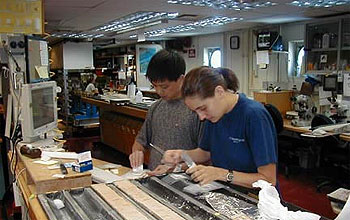News Release 04-152
New Ocean Drilling Research Findings Presented at American Geophysical Union (AGU) Fall Meeting

Sedimentologists Zhifei Liu (China) and Susan Keller (USA) examine the cores.
December 13, 2004
This material is available primarily for archival purposes. Telephone numbers or other contact information may be out of date; please see current contact information at media contacts.
Arlington, VA.--Scientists from around the globe will present research results on more than 200 discoveries made possible through scientific ocean drilling at the American Geophysical Union Fall Meeting in San Francisco from December 13-17, 2004. These papers, which draw upon three generations of ocean drilling programs supported in part by the National Science Foundation (NSF), provide new knowledge related to topics ranging from paleoclimatology to ocean sciences to volcanology.
Future opportunities for advances from the Integrated Ocean Drilling Program (IODP) will be discussed at a Town Meeting on Tues. evening, Dec. 14, from 5:30-7:45 p.m., at the Grand Hyatt Hotel, 345 Stockton Street. This briefing will highlight the scientific possibilities of the coming year as well as provide information on the inaugural IODP expeditions conducted with the research vessel JOIDES Resolution.
The following sessions highlight some of the ways in which ocean drilling contributes to understanding the Earth.
Rapid Climate Change
Ocean drilling has revolutionized scientists' understanding of rapid and extreme climate change. In these sessions, scientists will present research results that highlight advances in understanding the Paleocene-Eocene Thermal Maximum, a rapid global warming event that occurred 55 million years ago.
"Cretaceous/Cenozoic Greenhouse Climate Extremes: Causes and Consequences": Session 1 (PP11B), Mon. a.m., MCC 1 and Session II (PP14A), Mon. p.m., MCC 1
Climate Change Triggers
More than 15 papers on climate change research will be presented in two sessions. The research is based on nearly seven kilometers of sediment cores recovered from the Pacific Ocean. The sediments provide information on climate triggers and effects on several scales, from the slow tectonic uplift of the Andes, to abrupt climate shifts within human history.
"Changes in Southeastern Pacific Circulation, Productivity, and Continental Climate on Tectonic, Orbital, and Millennial Timescales": Session I (PP43B), Thurs. p.m., MCC 2000; and Session II (PP51F) Fri. a.m., MCC 2.
Plumes or Not?
Four sessions titled "Plumes or Not?" examine challenges to the long-held theory that plumes of hot material rising from the deep mantle, possibly as deep as the Earth's core, form "hot spots," major volcanic regions that are considered anomalous in a plate tectonic context. Ocean drilling has provided samples from many different types of environments, such as seamounts, plateaus and ridges, that span all major ocean basins and long periods of geologic time. A press conference on this topic will be held on Weds., Dec. 15 at 11:00 a.m.
Plumes or Not I (V43G) and II (V44B), Thurs. p.m., MCC 3008;
Plumes or Not III (V51B), Fri. a.m., MCC 1; Plumes or Not IV (V53C), Friday p.m., MCC 3008
-NSF-
Media Contacts
Cheryl L. Dybas, NSF, (703) 292-8070, email: cdybas@nsf.gov
Kasey White, IODP, (202) 232-3900, email: kwhite@joiscience.org
Program Contacts
James F. Allan, NSF, (703) 292-8581, email: jallan@nsf.gov
Rodey Batiza, NSF, (703) 292-7710, email: rbatiza@nsf.gov
The U.S. National Science Foundation propels the nation forward by advancing fundamental research in all fields of science and engineering. NSF supports research and people by providing facilities, instruments and funding to support their ingenuity and sustain the U.S. as a global leader in research and innovation. With a fiscal year 2023 budget of $9.5 billion, NSF funds reach all 50 states through grants to nearly 2,000 colleges, universities and institutions. Each year, NSF receives more than 40,000 competitive proposals and makes about 11,000 new awards. Those awards include support for cooperative research with industry, Arctic and Antarctic research and operations, and U.S. participation in international scientific efforts.
Connect with us online
NSF website: nsf.gov
NSF News: nsf.gov/news
For News Media: nsf.gov/news/newsroom
Statistics: nsf.gov/statistics/
Awards database: nsf.gov/awardsearch/
Follow us on social
Twitter: twitter.com/NSF
Facebook: facebook.com/US.NSF
Instagram: instagram.com/nsfgov


